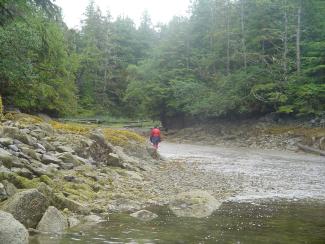Our research approach originally focused on three core themes: partnerships, material studies, and reflections on the relationship between our work and or aspirations. These principles remain at the core of all our work. Our current approach focuses on two related areas, The molecular analysis of materials and belongings from indigenous landscapes, and the refinement afield techniques using geophysical and remote sensing methods.
We have developed a network approach to the exploration of Indigenous history and environments by focusing on molecular analyses of archaeological materials from repository collections in the Materializing Histories project. Here we connect four Indigenous communities with five research laboratories from four universities to better understand Indigenous history in response to specific questions posted by our Indigenous partners. In this work we are especially attentive to issues of data sovereignty, data management and repositories, accessible frameworks for analyzing data, and the outputs of our efforts as publications, databases, and other formats.
We are cognizant of the long and ongoing history of colonialism and racism within which we exist that manifest as inequalities of support, education, and capacity between Indigenous and non-Indigenous Canadians. We employ an explicitly reflective approach to our work which seeks guidance from within and beyond our research teams to better assess the degree to which we can fulfill our ambitions.
We also work toward refinements of field methods and their related analysis, particularly in the application of near surface geophysics and remote sensing. In partnership with communities such as the Musqueam Indian Band and research centers such as the Institute for Prairie and Indigenous Archaeology, this work now focuses primarily on the technologies for conducting ground searches for missing children from Indian Residential Schools.
Our research team is diverse but engaged across the distances between us and focused on the needs and requests from our Indigenous partners. If you are interested in learning more about our work or connections with us, please contact the administrative PI, Andrew Martindale.

Photo of Andrew wandering off taken by Kisha.
